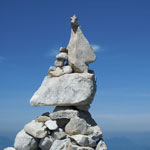
Photo: Cam Adams
Introverts & Loners. A Secret Weapon Against Pandemics?:
One of the strange problems that faces us during the Coronavirus pandemic is that we’re asked to act against our nature.
Everywhere you look, obscuring most of your face is mandated to help other people,
You are further encouraged to stay some distance away from them, too.
At the beginning, we were all told to even Self-Quarantine & Socially-Isolate.
This of-course drove most people a bit bonkers.
But a team of crafty researchers found that for a small fraction of the population, this is not only standard procedure, but it might actually help society…
The Short Answer:
- The Coronavirus pandemic has forced social people to be antisocial
- Social-Isolation is against most people’s nature
- Introverts & Loners may seem like evolutionary mistakes
- But Princeton’s team identified they exist in all living things
- If the genetic code survived, it was for a reason
- Loners & Introverts can avoid pandemics because of their nature
- They can then help populations reboot because of their survival
- So they are short-term antisocial, while secretly being long-term pro-social
Read on to find out the details…
→ Show/Hide Table Of Contents ←
Society Is Social & Agreeable:
So society is set up to be social; naturally.
And the “Be Agreeable & Cooperate” strategy is great for long-term success of the whole.
Everyone is different, we’re all good at different things, and there is strength in numbers.
But we still seem to have people called “Introverts”, who are not the ones out going technicolor-bonkers at the giant EDM festivals.
Among them, there might even be some people more extreme than that called Loners.
And if you listen to only mainstream society, they would tell you that the latter 2 groups are probably just evolutionary mistakes.
But that Princeton found that might not be true.
Every Species Has Loners. Are They Evolution’s Mistakes?:
It turns out that every species has some version of Loners, from those that break-off into very small groups, down to single individuals.
This can happen in populations of large mammals right down to insects.
But if the founding fathers were right and “United We Stand, Divided We Fall” is true,
Then are these small groups or individuals the same type of “error” society would call their human equivalents?
To find out, the Princeton team picked a much smaller and more-manageable organism to study.
The Humble Slime-Mold. Study Results On Herd-Behavior:
Even though it was a normally uninteresting microbe called Slime Mold,
It ended up doing some interesting & unexpected stuff.
In almost every single condition they put the microbes in, about 30% of the group refused to aggregate.
They would always peel-off and form a minimum of 30% in very small groups or Loners instead.
And the only time they were more than that was when the total population was very small.
A little bit the opposite of what humans might do in those conditions.
But Princetonians don’t experiment on humans in this way; at least I don’t think so.
Inherited DNA Code As Response To Environment:
So even though the Dr. Corina Tarnita’s evolutionary-biology team found the microbes weren’t choosing exclusively on their own,
They were doing more a combination of assessing total population and interacting with the environment,
The behavior persisted.
Which means it’s somehow in their genetic code.
And if that code survived, it was there for a reason.
Short-Term Vs. Long Term. Are They Really Antisocial?
So if that’s true for microbes, maybe it’s true for every type of living thing, right up to humans,
Who are only a little more sophisticated than slime mold in some cases.
And that’s where the Freakonomics-type trick comes in.
By being Anti-Social in the short-term, maybe the Loners/Small-Group Loners are actually being pro-social in the long term.
Because, what if for example, a pandemic like hoof & mouth disease, Spanish Flu, or Coronavirus hits an entire population?
Strength In Numbers, But Turned On Its Head:
And the previous “strength” in numbers of being social gets turned on its head, and becomes a real weakness?
Well then, there’s a good chance that the Loners would not be affected by the pandemic at-all.
They might act like the Appendix does in a human body.
Whenever your GI tract has a major catastrophe, your Appendix takes its small reserve of beneficial components,
And re-boots your gut microbes and your immune-system, sometimes in just about a month.
Since the Loner slime mold’s offspring also pull another rabbit out of their hat by displaying the ability to form both groups and single-individuals,
The Princeton team think that’s just what human Social Loners and introverts do around times like a coronavirus pandemic, and so turn out to be not such a big mistake after all!
References & Links:
• Source: Princeton
• Study: PlosBio – Eco-evolutionary significance of “loners”















